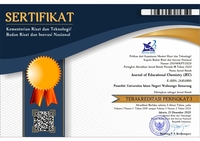Development of Interactive Multimedia Assisted of The HPLC Simulator to Enhance Student's Analytical Thinking Skills
DOI:
https://doi.org/10.21580/jec.2021.3.2.7852Keywords:
MMI HPLC, simulator, analytical skillsAbstract
This research aims to develop interactive multimedia by utilizing HPLC simulators to train students' analytical thinking skills, which will support dry lab practicum activities to be more meaningful. The research method is development research with a 4-D model design, defining, designing, developing, and disseminating. However, this research stage is limited to the development stage. The instruments used in this study include test and non-test instruments in student satisfaction questionnaires and observation of learning outcomes. The results showed that MMI assisted by an HPLC simulator helped students increase students' motivation and interest in studying HPLC material. In line with that, learning with the HPLC simulator can develop analytical thinking skills in the matching and classifying aspects, but has not trained in 3 other aspects, namely error analysis, generalizing, and specifying. It is recommended to use a learning approach such as STEM, which accommodates learning needs with the stages of inquiry, Engineering Design Process, and Product development to overcome the lack of development of analytical thinking skills in the aspects of analysis error, specifying, and generalizing.Downloads
References
Annissa, S., Musfiroh, I. & Indriati, L. (2019). Perbandingan Metode Analisis Instrumen HPLC dan UHPLC: Article Review. Farmaka, 17(3), 189-197.
Armbruster, D. A., Overcash, D. R. & Reyes, J. (2014). Clinical Chemistry Laboratory Automation in the 21st Century - Amat Victoria Curam (Victory loves careful preparation). Clin Biochem Rev., 35(3): 143–153.
Beek, F. T., Edam, R., Pirok, B. W. J., Genuit, W. J. L. & Schoenmakers, P. J. (2018). Comprehensive Two-Dimensional Liquid Chromatography of Heavy Oil. Journal of Chromatography A, 1564, 110-119.
Boswell, P.G., Stoll, D. R., Carr, P. W., Nagel, M. L., Vitha, M. F. & Mabbott, G. A. (2013). An Advanced, Interactive, High-Performance Liquid Chromatography Simulator and Instructor Resources. J. Chem. Educ., 90(2), 198−202.
Bowen, R. S., Picard, D. R., Susan, V. S. & Brame, C. J. (2018). Incorporating Student Design in an HPLC Lab Activity Promotes Student Metacognition and Argumentation. J. Chem. Educ., 95(1), 108–115.
Cresswell, S. L. & Loughlin, W. A. (2015). An Interdisciplinary Guided Inquiry Laboratory for First Year Undergraduate Forensic Science Students. J. Chem. Educ., 92(10), 1730–1735.
Dong, A., Jong, M. S. Y. & King, R. B. (2020). How Does Prior Knowledge Influence Learning Engagement? The Mediating Roles of Cognitive Load and Help-Seeking. Educational Psychology, 11, 591203.
Doyan, A., Gunawan & Subki. (2019). Pengembangan Multimedia Interaktif Fisika Melalui Pendekatan Saintifik dan Pengaruhnya Terhadap Hasil Belajar dan Keterampilan Generik Sains Siswa. Jurnal Penelitian dan Pembelajaran Fisika Indonesia, 1(1), 6-16.
Dvořák, M., Dubský, P., Dovhunová, M. & Gaš, B. (2018). The dynamics of Band (peak) Shape Development in Capillary Zone Electrophoresis in Light of The Linear Theory of Electromigration. Electrophoresis, 40(5), 668-682.
Hafiz, N. R. M. & Ayop, S. K. (2019). Engineering Design Process in Stem Education: A Systematic Review. International Journal of Academic Research in Business and Social Sciences, 9(5), 676 – 697.
Han, H. J. & Sim, K. C. (2019). Development of an Engineering Design Process-Based Teaching and Learning Model for Scientifically Gifted Students at The Science Education Institute for The Gifted in South Korea. Asia Pac. Sci. Educ., 5, 13.
Holler, F. J., Skoog, D. A. & West, D. M. (1996). Fundamentals of Analytical Chemistry. Philadelphia: Saunders College Pub.
Irwanto, Rohaeti, E., Widjajanti, E. & Suyanta. (2017). Students' Science Process Skill and Analytical Thinking Ability in Chemistry Learning. AIP Conference Proceedings, 1868, 030001.
Kovarik, M. L. (2016). Use of Primary Literature in The Undergraduate Analytical Class. Anal. Bioanal. Chem., 408, 3045–3049.
Pirok, B. W. J., Andrea F. G., Gargano, A. F. G. & Schoenmakers, P. J. (2017). Optimizing Separations in Online Comprehensive Two-Dimensional Liquid Chromatography. Journal of Separation Science, 41(1), 68-98.
Prastyo, B., Suwahono & Suryandari, E. T. (2020). Program Sistem Manajemen Laboratorium Kimia Menggunakan Microsoft Visual Studio Community 2019 Berbasis Pengembangan Berkelanjutan. Journal of Educational Chemistry (JEC), 2(1), 18-25
Santos, K., Loures, E., Piechnicki, F. & Canciglieri, O. (2017). Opportunities Assessment of Product Development Process in Industry 4.0. Procedia Manufacturing, 11, 1358 – 1365.
Sudrajat, A., Permanasari, A., Zainul, A. & Buchari. (2011). Pengembangan Rubrik Asesmen Kinerja untuk Mengukur Kompetensi Mahasiswa Melakukan Praktikum Kimia Analisis Volumetri. Jurnal Chemica, 12(1), 1 – 8.
Sugiyono. (2017). Metode Penelitian Kuantitatif, Kualitatif dan R&D. Bandung: PT. Alfabeta.
Sukmadinata, N. S. (2006). Metode Penelitian Pendidikan. Bandung: Remaja Rosdakarya.
Sutarno. (2011). Penggunaan Multimedia Interaktif pada Pembelajaran Medan Magnet untuk Meningkatkan Keterampilan Generik Sains Mahasiswa. Jurnal Exacta, 9(1), 60-66.
Thiagarajan, Semmel & Semmel. (1974). Instructional Development for Training Teachers of Exceptional Children a Source Book. Indiana: ERIC.
Widayat, W., Kasmui & Sukaesih, S. (2014). Pengembangan Multimedia Interaktif sebagai Media Pembelajaran IPA Terpadu pada Tema Sistem Gerak Pada Manusia. Unnes Science Education Journal, 3(2), 535-541.
Downloads
Published
How to Cite
Issue
Section
License
The copyright of the received article shall be assigned to the journal as the publisher of the journal. The intended copyright includes the right to publish the article in various forms (including reprints). The journal maintains the publishing rights to the published articles.
Authors are permitted to disseminate published articles by sharing the link/DOI of the article at the journal. Authors are allowed to use their articles for any legal purposes deemed necessary without written permission from the journal with an acknowledgment of initial publication to this journal.

This work is licensed under a Creative Commons Attribution-NonCommercial-ShareAlike 4.0 International License.


